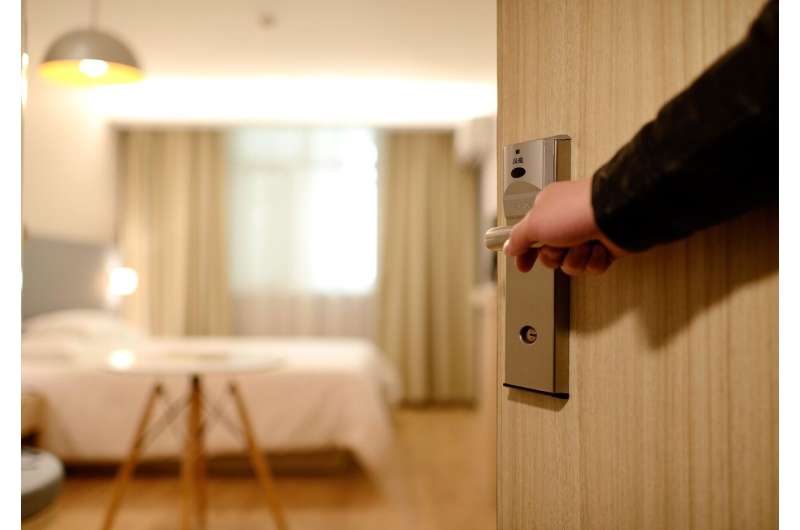
Hotel guests who can customize their rooms by selecting the layout, snack bar offerings, and softness of the pillows are more likely to become loyal customers of that hotel and recommend it to others.
A new study published in Cornell Hospitality Quarterly finds that guests who gain some sense of ownership for their hotel room show a greater attachment to the brand after they check out. Encouraging “psychological ownership” of hotel rooms offers a new, cost-effective strategy to enhance customer loyalty, said study co-author Suzanne Shu, dean of faculty and research at Cornell University’s SC Johnson College of Business and John S. Dyson Professor of Marketing at the Charles H. Dyson School of Applied Economics and Management.
“These very small interventions, including allowing people to choose their room at the time of check-in or encouraging them to move the furniture around, can have a big impact on the sense of ownership that people feel and the loyalty they have towards the hotel,” Shu said.
The paper, “Increasing Hotel Loyalty through Psychological Ownership,” relied on four separate studies that showed the tangible benefits of increasing guests’ psychological ownership of their rooms. The study defined psychological ownership as a perceptual state that is “best described as the territorial feeling that something is ‘mine.'”
The impact of psychological ownership of hotel rooms
While the concept of psychological ownership has been used to study employee behavior in organizational settings, Shu and one of the paper’s co-authors, Joann Peck, a professor of marketing at the University of Wisconsin–Madison, were the first researchers to apply it to the field of marketing in a paper published in 2009.
Shu compared the concept to the sales process involving a consumer who test-drives a car and begins to feel attached to it even before making an offer on it. “What our research shows is that that will affect decisions like how much you’re willing to pay for it, because you really think of it as yours and value it a lot more,” she said.
After exploring the concept’s effect on public spaces like parks, Shu wanted to explore whether psychological ownership would apply to spaces that consumers don’t own, such as a hotel room. She and her co-authors created four experiments that tested whether three strategies that promote psychological ownership would have an impact on the hotel guest experience: controlling the space, investing oneself in it, and having intimate knowledge of it.
The first experiment they designed was conducted at the campus hotel at the University of Wisconsin–Madison, where they asked prospective guests to choose their hotel room from a map, allowing them to pick a layout and floor.
“The process didn’t make their check-in process any smoother, any shorter or more convenient, but it increased their willingness to be loyal to the hotel, come back to the hotel and refer this hotel to other people around them,” said Rin Yoon, a co-author of the paper and a Ph.D. candidate in marketing at the Samuel Curtis Johnson Graduate School of Management who will be teaching at the University of Iowa next fall.
In another experiment, the study analyzed a set of 14,689 reviews of a hotel in Hawaii on TripAdvisor. The assessment showed that guests who felt a sense of ownership for their hotel room wrote longer reviews and reported higher satisfaction levels on the app.
The study determined that guests who wrote reviews with the possessive pronouns “my” or “our” were more likely to have gained some sense of psychological ownership of their room. “That was a sign that they did feel ownership,” Shu said. “People aren’t going to say, ‘my room’ or ‘our room,’ unless they did feel some sense that it was theirs while they were there.”
The final two experiments created hypothetical check-ins online that included assessing whether a customer personalizing a room or using the hotel’s data based on previous preferences was more effective in promoting brand loyalty. The study found that guests who customized their room on their own showed greater loyalty to their hotel.
Applying the study’s results
Hotel chains have already begun using some of the strategies identified in the study, including allowing guests to personalize their rooms at check-in. That process forces guests to “exert their time and effort and invest themselves in their room,” which can promote loyalty, Yoon said.
Another strategy hotels could adopt to promote psychological ownership is allowing guests to rearrange some of the furniture in their rooms. That is exactly what Shu did during a recent hotel stay during a business trip.
“One of the first things I did to get myself set up to work was move the table a little bit closer to the window and prop the door open so I could get more sunlight from the outside,” she said. “If you allow a guest to customize their environment a little bit more, they’ll end up feeling more ownership over it because it’s like at home—they can customize their space.”
More information:
Y. Rin Yoon et al, Increasing Hotel Loyalty through Psychological Ownership, Cornell Hospitality Quarterly (2025). DOI: 10.1177/19389655241309634
Provided by
Cornell University
Citation:
Enabling hotel guests to customize their rooms fosters customer loyalty (2025, March 6)
retrieved 6 March 2025
from https://phys.org/news/2025-03-enabling-hotel-guests-customize-rooms.html
This document is subject to copyright. Apart from any fair dealing for the purpose of private study or research, no
part may be reproduced without the written permission. The content is provided for information purposes only.

